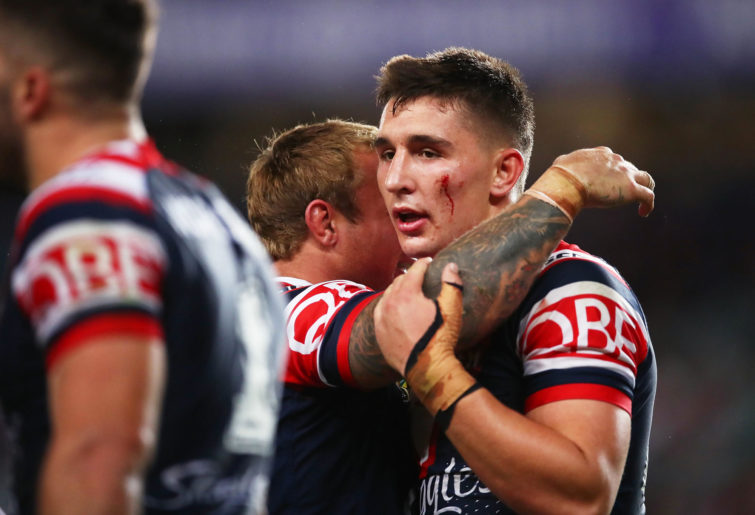I don’t know the ins and outs of Corey Norman and Victor Radley being suspended. I’ve read of street fights, protestations of innocence and liberal dashings of people acting like dickheads throughout.
I don’t have enough information to form an opinion as to whether the two players’ punishments – Norman was hit with a $10,000 fine and suspended for one match, while Radley will surrender $20,000 (half suspended) and sit out two games – are harsh or fair.
Frankly, I don’t care either way.
I’ve made my opinion regarding the Integrity Unit’s maddening inconsistency clear, so this time around, I’ll defer to that wonderful Polish saying: not my circus, not my monkeys.
The aspect that deserves further scrutiny here is that in both cases, it was flagged in a variety of ways that the players’ culpability should be lessened because women were present.
James Segeyaro was also involved in the incident with Norman and shortly after, the clothing brand the pair co-own, YKTR, released a statement.
“The two boys were walking home after a dinner with two females, when they were approached by a group of four men. One of whom began to racially abuse Chicko [Segeyaro], calling him the N word,” the statement on Instagram claimed.
“Although we don’t condone violence, if there is a time to fight, then let it be against racism, protecting female company and having your friend’s back.”

Corey Norman (Photo by Mark Kolbe/Getty Images)
They sound like decent goals, although ‘fighting’ really is something we should do with our words – even against racism. But the part I don’t get is the idea of “protecting female company”.
What if the female in your company is Amanda Nunes? Reckon the UFC’s pound-for-pound top ranked woman needs someone protecting her?
The attitude that all women need the protection of men is a form of paternalism that helps to maintain a sexist status quo in an underhanded and insidious fashion.
In fact, perhaps the most insidious aspect of it is how reasonable it can sound – defending a person seems entirely fair and even noble. But to declare that female company needs protection is to say that women are less-than.
That’s really not a complicated piece of verbal acrobatics or misrepresentation on my part, it’s a clear implication.
Regarding Radley, in his Saturday opinion piece for the Daily Telegraph, Paul Kent took issue with the fact the incident came about because the bloke the young Rooster was sorting out had knocked a woman over.
“[Radley] should be applauded for taking a stance that is difficult to argue for nowadays but will forever remain correct. A young woman was attacked and the offender was dealt with,” Kent wrote.
“Unfortunately, though, words like chivalry and character are old-fashioned now, a punchline for the progressives.”
Now, unlike some of my fellow Roar columnists, I reckon Kenty is the business.
He’s a great writer (seriously, the ability to work out where hyphens and apostrophes go is embarrassingly rare in modern journalism), he spins a hell of a yarn, and he holds strong opinions based on both his research and personal values.
I don’t necessarily agree with a lot of what he says, but I respect both him and the way he goes about his business.
But on this front, he is pushing a line – one that I’ll admit I’m guilty of toeing, but am wising up to – that is wrong.
I too believe that chivalry and character are noble traits that are all too often dismissed these days. But this isn’t the middle ages – you no longer display chivalry by demanding satisfaction via physical altercation when a woman’s honour has been insulted.
Never mind that we should use our words, not our fists, the idea that protecting women is part and parcel of character and chivalry is fundamentally wrong.
It’s not protecting those who require it that is the issue, it’s the inference that because the person who Radley was defending was a woman, she was by definition in need of protection.
Kent went on to ask about the injustice “the poor woman inside” had faced, before citing “Women In League round to anti-violence campaigns” as evidence the NRL “has never worked harder to respect and acknowledge women than it does now”.

Victor Radley (Photo by Matt King/Getty Images)
And I agree with him – the NRL is working hard to not be the dinosaur code. But while defending a woman is obviously preferable to committing violence against her, the idea it is necessary perpetuates a paternalistic viewpoint of the world: women are weak and defenceless and need the protection of a strong, just man.
Like I said, we don’t know exactly what happened with Radley or Norman, so I’m not going to put words in their mouths.
But the words that have come out about both – from Kent sympathising with that poor woman through to YKTR declaring their brand will defend females – perpetuate this paternalistic viewpoint.
It’s time to leave these attitudes in the past.
If Radley and Norman genuinely defended a person or people who required protection, then good for them – but the person’s gender really has nothing to do with it. I’m useless in a fight, while plenty of women can kick arse. Why should defending a man who needs help somehow make violent actions worse, while coming to the aide of a woman is essential?
It’s a wildly outdated attitude and a crucial part of changing these entrenched notions is to address the way we talk about them.
In a piece published on The Roar years ago, I asked, “almost every young boy in Australia is told ‘don’t hit girls’. It’s kindergarten stuff… But rather than ‘don’t hit girls’ shouldn’t we be teaching our kids ‘don’t hit’?”
Go back to what YKTR posted and tell me if this is worse: “if there is a time to fight, then let it be against racism, protecting company and having your friend’s back.”
How about if Kent had set out that Radley’s actions came about because “a young person was attacked and the offender was dealt with.”
I’d argue that in both instances, you’ve got a far more balanced and reasonable argument.
There is no question that from time to time, a person who needs protection will be a woman. But calling out their gender really shouldn’t matter.
By using the defence of a woman, rather than the defence of a person, as justification for violence, you add insult (to women) to injury (of the person you belted).






























































































